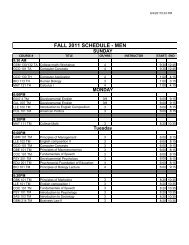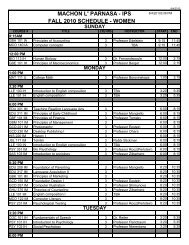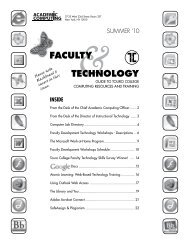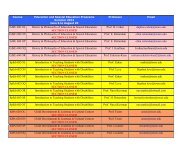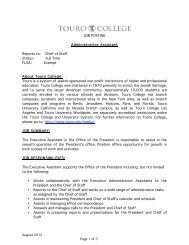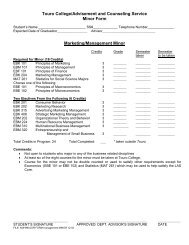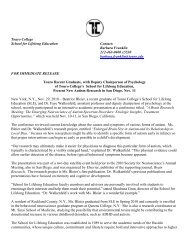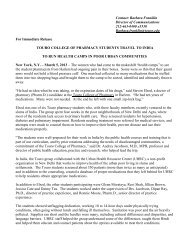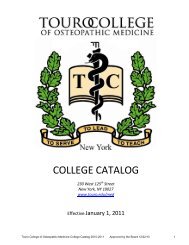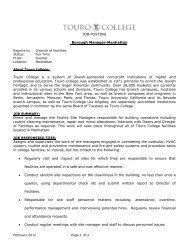Immunization Forms - Touro College
Immunization Forms - Touro College
Immunization Forms - Touro College
You also want an ePaper? Increase the reach of your titles
YUMPU automatically turns print PDFs into web optimized ePapers that Google loves.
MENINGOCOCCAL MENINGITIS VACCINATION<br />
RESPONSE FORM<br />
(Please see information included with this sheet.)<br />
New York State Public Health Law requires that all college and university students enrolled for at least six (6)<br />
semester hours or the equivalent per semester, or at least four (4) semester hours per quarter, complete and<br />
return the following form to the <strong>Touro</strong> <strong>College</strong> Registrar’s Office.<br />
Check one box and sign below.<br />
I have:<br />
had the meningococcal meningitis immunization (Menomune) within the past 10 years.<br />
Date received:<br />
read, or have had explained to me, the information regarding meningococcal meningitis disease. I will<br />
obtain immunization against meningococcal meningitis within 30 days from my private health care<br />
provider.<br />
read, or have had explained to me, the information regarding meningococcal meningitis disease. I<br />
understand the risks of not receiving the vaccine. I have decided that I will not obtain immunization<br />
against meningococcal meningitis disease.<br />
registered for under six (6) semester hours.<br />
Signed _____________________________________________<br />
Date _____________________<br />
Print Name _________________________________________<br />
Date of Birth ____________________<br />
E-mail address ______________________________________<br />
Soc. Sec. # ______________________<br />
Mailing address _____________________________________<br />
Phone # _______________________<br />
_____________________________________
Meningococcal Disease<br />
New York State Department of Health<br />
Bureau of Communicable Disease Control<br />
What is meningococcal disease?<br />
Meningococcal disease is a severe bacterial infection of the bloodstream or meninges (a thin lining<br />
covering the brain and spinal cord).<br />
Who gets meningococcal disease?<br />
Anyone can get meningococcal disease, but it is more common in infants and children. For some college<br />
students, such as freshmen living in dormitories, there is an increased risk of meningococcal disease.<br />
Between 100 and 125 cases of meningococcal disease occur on college campuses every year in the United<br />
States; between 5 and 15 college students die each year as result of infection. Currently, no data are<br />
available regarding whether children at overnight camps or residential schools are at the same increased<br />
risk for disease. However, these children can be in settings similar to college freshmen living in<br />
dormitories. Other persons at increased risk include household contacts of a person known to have had<br />
this disease, and people traveling to parts of the world where meningitis is prevalent.<br />
How is the germ meningococcus spread?<br />
The meningococcus germ is spread by direct close contact with nose or throat discharges of an infected<br />
person. Many people carry this particular germ in their nose and throat without any signs of illness, while<br />
others may develop serious symptoms.<br />
What are the symptoms?<br />
High fever, headache, vomiting, stiff neck and a rash are symptoms of meningococcal disease. Among<br />
people who develop meningococcal disease, 10-15% die, in spite of treatment with antibiotics. Of those<br />
who live, permanent brain damage, hearing loss, kidney failure, loss of arms or legs, or chronic nervous<br />
system problems can occur.<br />
How soon do the symptoms appear?<br />
The symptoms may appear two to 10 days after exposure, but usually within five days.<br />
What is the treatment for meningococcal disease?<br />
Antibiotics, such as penicillin G or ceftriaxone, can be used to treat people with meningococcal disease.<br />
Is there a vaccine to prevent meningococcal meningitis?<br />
Yes, a safe and effective vaccine is available. The vaccine is 85% to 100% effective in preventing four<br />
kinds of bacteria (serogroups A, C, Y, W-135) that cause about 70% of the disease in the United States.<br />
The vaccine is safe, with mild and infrequent side effects, such as redness and pain at the injection site<br />
lasting up to 2 days. After vaccination, immunity develops within 7 to 10 days and remains effective for<br />
approximately 3 to 5 years. As with any vaccine, vaccination against meningitis may not protect 100% of<br />
all susceptible individuals.<br />
How do I get more information about meningococcal disease and vaccination?<br />
Contact your family physician or your student health service. Additional information is also available on<br />
the websites of the New York State Department of Health, www.health.state.ny.us; the Centers for<br />
Disease Control and Prevention www.cdc.gov/ncid/dbmd/diseaseinfo; and the American <strong>College</strong> Health<br />
Association, www.acha.org.



